
The discovery of human pluripotent stem cells just over twenty-five years ago almost immediately engendered widespread enthusiastic speculation concerning their future potential in research and medicine: a future as models for early human development, as platforms for functional human genomics, as tools for the study of disease, drug screening and toxicology, and as a renewable source of cellular therapeutics for a range of intractable diseases. In this lecture, Dr. Martin Pera, a noted expert in the pluripotent stem cell field, will assess the progress thus far and the prospects and challenges ahead.
The UConn/UConn Health Stem Cell Research Oversight (SCRO) Committee invites you to this one-hour lecture followed by a 30-minute Q&A session!
Date: Monday, May 13, 2024
Time: 4:00 p.m. – 5:30 p.m. EDT
Presenter: Dr. Martin Pera
Topic: Human Pluripotent Stem Cells Twenty-Five Years On
Registration Link: WebEx Registration Link
Martin Pera, Ph.D., The Jackson Laboratory
Martin Pera is a Professor at the Jackson Laboratory in Bar Harbor, Maine. He is the Chair of the Steering Group of the International Stem Cell Initiative, a member of the Board of Directors of the International Society for Stem Cell Research, and Editor-in-Chief of the society’s journal, Stem Cell Reports. His laboratory when at Monash University was the second in the world to isolate embryonic stem cells from the human blastocyst, and the first to describe their differentiation into somatic cells (neurons) in vitro. His current research is focused on understanding cell state transitions in pluripotent stem cells, and on the use of pluripotent stem cells to study disorders of the central nervous system and the development of cell therapy for age-related macular degeneration. Dr. Pera’s research interests are the cell biology of pluripotency and the applications of human pluripotent stem cells in disease modeling and therapy.
For questions, contact Ellen Ciesielski, UConn/UConn Health SCRO Coordinator, Research Integrity & Compliance.
 Did you know that UConn Health is part of the ResearchMatch Network? ResearchMatch.org is a national online recruitment tool, funded by the National Institutes of Health and maintained at Vanderbilt University. ResearchMatch connects interested participants with health-related research studies that might be a good “match” for them through its secure, online matching tool. There is no cost to UConn Health researchers who use ResearchMatch to conduct recruitment feasibility analysis or participant recruitment.
Did you know that UConn Health is part of the ResearchMatch Network? ResearchMatch.org is a national online recruitment tool, funded by the National Institutes of Health and maintained at Vanderbilt University. ResearchMatch connects interested participants with health-related research studies that might be a good “match” for them through its secure, online matching tool. There is no cost to UConn Health researchers who use ResearchMatch to conduct recruitment feasibility analysis or participant recruitment.